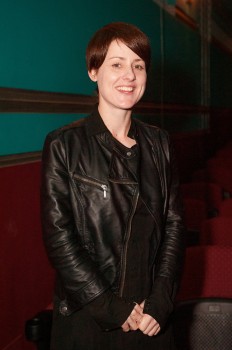Film-makers on their first features
From horror to doco, Colin Delaney speaks to five film-makers about their feature length debut.
Director Kevin Smith famously funded his first film, Clerks, by selling off his prized comic book collection. Pedro Almodovar’s first foray into features was so technically flawed, he reportedly put it down to personal style. And finishing Hard Eight was a baptism of fire, according to Paul Thomas Anderson, who has been quoted as saying: “I learned all the lessons I needed to learn on the first film about protecting myself and how to keep a lock on the editing room door.” Such are the trials and trade offs of film-makers when it comes to making their first feature.
The reality, according to Screen Australia, is that between 1970 and 2011, approximately 70 per cent of first-time producers, directors and writers didn’t go on to make a second film. Martha Coleman, head of development at Screen Australia, says: “There is a certain element of natural selection. People are fuelled by pure passion to make their first film, which is often smaller, very personal, character based. At the end of the day, it’s bloody hard to make a living as a director, writer or producer and many people peel off into other, often related, areas contributing to our industry in other ways. I think many people just don’t have a second film in them and actually that’s okay.”
But that doesn’t stop newcomers giving it a shot. “I believe wholeheartedly in ‘out of adversity, comes creativity’,” says Justin Dix, who wrote, directed and produced his first film Crawlspace, a genre piece expected in local theatres in early 2013.

Justin Dix’s film Crawlspace
Dix says: “As an independent film-maker you really need to think outside the square. Getting my first feature up has been a long time coming and I was going about it the wrong way in the past. For many years I’ve done the pitching thing around Hollywood and even tested the waters with government development.”
Dix came up through the ranks in the art and production design departments on big-budget features Star Wars Episodes II and III. This demystified the film-making process and gave him the confidence to not only leap from technician to boss but to take the independent route; no big studio, no funding body. He did it all with just one short film to his name. The experience, Dix says, was liberating, with complete control over all aspects of the creation.
Alternatively, Liz Kearney, first-time producer of These Final Hours, has had a very clear funding body route. Following a post grad in journalism, Kearney worked at Screen West in the funding department.
She says: “It helped me understand the lay of the land in terms of financing and development from an agency perspective.” Kearney went on to run Fremantle’s Film and TV Institute funding program. It was there she met writer/director Zak Hilditch and they began working together. Her insight into funding bodies and their offerings helped the pair apply for a range of labs, workshops and initiatives. Kearney says: “I am very aware of the importance of applying for such initiatives. It forces you to answer some realistic issues. We learned what was working and what wasn’t and what project we thought would be a good first feature.”
The pair created These Final Hours, a feature script about redemption set against an impending apocalypse. They applied to Screen Australia’s first Springboard Initiative, a workshop for film-maker teams to create a complementary short film which incorporated elements or styles specific to their feature. The short film, Transmission, went on to win multiple awards including best film and best director at the St Kilda Short Film Festival. These Final Hours began shooting in October. Kearney’s hard work in creating a strong portfolio and firm understanding of the industry has underpinned her development to this point with her chief piece of advice being to never underestimate the power of a great short film as your calling card to the industry.
Julius Avery will attest to that. A masters graduate at the Victorian College of Arts, the film-maker’s 2008 short film Jerrycan won the Jury Prize at the Cannes Film Festival in 2008 as well as an AFI that year for best short film. The film-maker returned to the esteemed French festival this year with another film in competition, Yardbird, which he penned. More importantly, he returned to Cannes with his feature script, Son of a Gun, to market his directorial debut.
Avery says: “All the planets had aligned and Son of a Gun, about a master criminal who takes on an apprentice, was ready to show the world. It was hectic, a dozen meetings a day, sometimes very late into the night. Pitching your film is one thing but pitching yourself is harder. You really need to know the type of film you want to make and the type of film-maker you want to be.”
Finding a mentor
In art as in life, and as with any apprenticeship, a student needs a great mentor. Avery had two. Script editor John Collee, scriptwriter of Happy Feet and Master and Commander, helped Avery uncover elements he’d not previously seen on the page. Meanwhile producer Tim White (Two Hands, The Boys Are Back and Two Little Boys) demonstrated in Cannes the art of the pitch, not to mention the power of inspiring optimism, the belief that it was ‘always going to happen’. And it did. The film is currently in pre-production with Ewan McGregor in the lead role.
Likewise for Kearney, Screen Australia matched them to local heavyweight Robert Connolly who came on board as EP with his company Footprint Films distributing the film. Kearney says Connolly’s involvement has been crucial as a sounding board for decision-making and opening important industry doors.
Similarly for Dix, executive producer Greg McLean, director of Wolf Creek, was instrumental in developing the script and offered key advice on setting the right tone.
Alternate paths
But not every first time film-maker comes up through what could be seen as a traditional path guided by an experienced member of the industry.
Simon Lee, creative partner of ad agency The Hallway, entered advertising in the late ’90s after trying his hand at journalism and other creative pursuits. Advertising was the most financially viable way to feed his desire to create despite having strong leanings toward film. As he approached 40, Lee decided it was now of never and he took the plunge.
“You need a certain amount of naivety and unfailing self-confidence to put your money where your mouth is,” he says, speaking both literally and figuratively, having made a considerable personal investment in Dream Racer, his documentary about an amateur motorbike rider named Christophe taking part in the world’s most dangerous motor race, the Dakar Rally. The title is a nod not just to Christophe’s journey but also Lee’s as he chased his dream, leaving his job behind. Despite having no formal film training, just experience on commercial sets, Lee was director and data wrangler, writer and runner in making Dream Racer. The motto he worked by: “Shoot the shit out of it – then have a brilliant editor who understands story.” The project was a major physical, financial and mental undertaking and Lee is now in talks to find a distributor, but it’s not proving easy. He says: “Directors probably underestimate the value of a bloody great producer. Had I had the budget, the first thing I would have invested in was a bloody great producer.”
However, given the chance to relive the gruelling 16-day, around-the-clock shoot required to create the film, Lee says he wouldn’t do anything differently. He says: “Every mistake you make is an invaluable lesson. My advice is to go and do it. Don’t be put off by lack of budget and lack of experience.” If nothing else, Lee hopes Dream Racer will act as that all-important calling card Kearney spoke of.
Going for broke
Taking the adland upheaval further are Jeremy Ervine and David Campbell, formerly of Adelaide agency, Fnuky. After completing just one Tropfest film, the pair put their agency up for sale to fund their first feature, Lemon Tree Passage, a horror film based on a South Australian urban myth. Campbell, writer and director, says: “In advertising everything is fast and spontaneous. We’ve brought a little bit of that to making this film. It’s not gone through the many years of love, hard work and development that most films do. It’s been at a rate that you normally wouldn’t make a film but it’s been an incredible experience for that reason.” Shot in 20 days, the film is now in post-production with the film-makers speaking with distributors eager to hear their story.
Producer Ervine says: “If you’re patient, working with the film bodies is a really good pathway as a first time film-maker but we decided not to take that path. Not because there is something wrong with it, we just thought, let’s take a different path.”
They didn’t go in entirely blind however, as Ervine explains. “We travelled to the US doing a research trip and meeting with producers across a range of levels in the industry and hearing their experiences. We took a lot of inspiration from them.”
Campbell adds: “We got the sense that what we were doing, on that side of the world, wasn’t that unusual. Their advice was know what movie you’re making and what budget you’re making it on and write and produce it to that level. When it comes out, it won’t feel like an art piece. It’s commercial with a simple and strong story. We’re advertising people – of course we’re going to have business hats on when we put our hand to anything.”
Talent, professionalism, perseverance, optimism and gut instinct are all key attributes needed when setting out down that path, not to mention, as Coleman points out: “A strong first-time voice. But after that first film the market wants to see that talent stretch themselves and progress towards stories that have a wider reach or explore new territory.”
What’s more, she says: “Develop your savvy as well as your artistry. The marketplace wants to know what you’re doing next and there’s a window of opportunity that can be exploited if you do have a second film to pitch.”
Sure enough, Dix, Kearney, Lee, Avery, Campbell and Ervine have the next idea in development, although are careful not to disclose too much, as they’re all too aware just how fickle the industry can be.
That said, their collective enthusiasm can be summed up by Dix’s sentiments, in LA for the US premiere of Crawlspace. He says: “I’m taking a lot of meetings to pitch my own projects and to read theirs. I don’t really know what to expect, but rest assured I’m not going to wait around to find out. I’m going to take this bull by the horns and run with it.”
- This article first appeared in Encore magazine. Download the iPad edition, now free.






